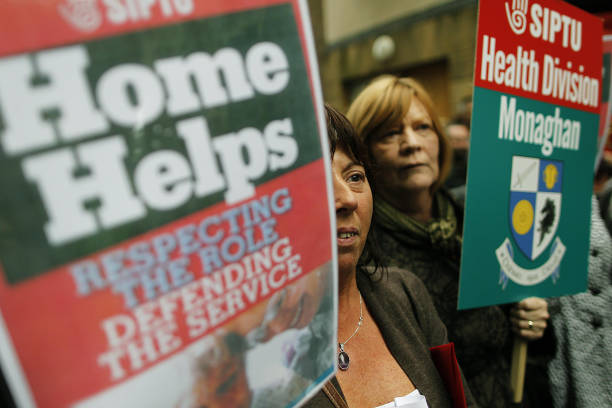SIPTU members in the Public Service to receive pay increase from 1st January
SIPTU members in the Public Service will receive a pay increase from 1st January, 2020, as part of the Public Service Agreement 2018-2020 which places a particular emphasis on raising the wages of lower paid workers.
SIPTU Deputy General Secretary, John King, said : “Low paid public service workers who earn up to €32,000 per year will receive a basic pay increase of 0.5% with effect from 1st January 2020.
“This is in addition to the 1.75% paid with effect from 1st September 2019 and will be boosted by a further 2% due on 1st October 2020.
“In addition, the income of public service workers will be further increased on 1st January 2020 with a raising of the threshold on the Additional Superannuation Charge to €34,500 giving an increase of approximately €250 per annum. These measures were agreed as part of the provisions of the Public Service Agreement 2018-2020.”
He added: “In negotiations for the current Public Service Agreement, SIPTU representatives prioritised the need for pay increases for lower paid public service workers. It is essential that these staff, who form the backbone of our public services in areas including health and the local authorities, receive the recognition they deserve with pay increases which will allow them to better provide for themselves and their families.
“SIPTU remains committed to increasing the standard of living of these workers in any future Public Service Agreements.”

JLCs are good for workers and the economy
Joint Labour Committees (JLCs) are made up of representatives of employees and employers and set minimum wages and working conditions across various employment sectors of the economy.
They originated in Ireland over a hundred years ago, retained by the independent state and went on to eventually cover a range of industries including hotels, catering, contract cleaning, retail, agriculture and other low-paid sectors.
When operating effectively, JLCs allow sector-wide collective bargaining that benefits workers, good employers and customers.
In 2014, the Government and the Oireachtas renewed the JLCs after they were struck down by the High Court. However, some employer organisations have blocked their operation. They do this by simply refusing to participate in the JLCs.
This has resulted in low wages, poor working conditions and exploitative business practices in those sectors, notably in the hotels and hospitality industry – the same problems that gave rise to their introduction more than a century ago.
The Industrial Relations (Joint Labour Committees) Bill 2019, proposed by Senator Ged Nash of the Labour Party, if enacted, will ensure that the functioning of JLCs cannot be obstructed. It would allow the Labour Court to make its own binding proposals in sectors where either the employer or employee representatives refuse to engage in the JLC.
This would allow the JLCs to operate as the Oireachtas intended them to and would be a strong incentive to employers to end their obstructionist tactics.
JLCs can raise wages and working conditions for all workers across a sector. This stops one business from undercutting another by paying lower wages. This protects both workers and businesses from ‘race-to-the-bottom’ exploitative practices.
The effective operation of JLCs is also good for the wider economy. Low pay is a drag on public finances. JLCs can help improve public finances. Increasing wages and working conditions boost tax and PRSI revenue while reducing social protection payment that are needed to subsidise low pay.
Poor pay and working conditions are economically inefficient. Businesses that rely on workers’ purchasing power suffer lower turnover which undermines their ability to succeed. Increased wages mean increased business activity and investment.
It is not just about wages and working conditions. JLCs ensure workers are provided a voice in their workplace. Though their union representatives, they can participate in negotiations over their contracts. Such voice and participation is the essence of democracy in the workplace.
Business productivity can also be increased by effective democracy in the workplace. Sector-wide collective bargaining reduces turnover and avoids conflict on the workplace floor.
Costs are lowered while income rises for businesses. Collective bargaining respects the skills and competences of each worker which, in turn, ensures that businesses can attract and retain employees in their workplace.
JLCs represent a new type of flexibility in the modern economy. Some employers can face real difficulties in the competitive market. There are ‘inability to pay’ clauses in the JLCs to protect them. Just as importantly, collective bargaining helps ensure that employee and employer representatives can more easily reach solutions as each side knows what is necessary for business survival.
Everyone who works hard for a living should be able to take home a Living Wage. This should be the measure of a decent society and this Bill will assist the nearly one quarter of workers in Ireland who are on low pay.
SIPTU fully supports The Industrial Relations (Joint Labour Committees) Bill 2019. We call on workers and trade unionists – especially those in the sectors that will directly benefit from the legislation – to contact politicians and ask them to support this Bill.
Politicians that do not support a realistic measure to raise the income floor for the lowest paid workers in the country, including those in the hospitality and contract catering industry, should pay the price when the next election comes around.

Inquest highlights the urgent need for emergency ambulance hand-over protocol
SIPTU representatives have tonight (Wednesday 4th December) demanded the introduction of an emergency hand-over protocol to assist ambulance crews who are unable to hand over patients to hospital staff due to overcrowding and lack of bed capacity.
The call comes as the Medical Director of the National Ambulance Service, Professor Cathal O’Donnell, told an inquest into the death of Margaret Callaghan today that the issue of ambulance hand-over delay is “endemic” and it is getting worse.
SIPTU Health Division Organiser, Paul Bell said: “Our members have again expressed their deep concerns that the overcrowding crisis is obstructing them from doing their jobs effectively and they have demanded that an emergency handover protocol is put in place immediately to deal with it. We have an unacceptable situation where ambulance professionals and very expensive equipment is being held up for hours while other patients need immediate care. This is not sustainable and the Minister for Health needs to get involved before more lives are tragically lost. We need an immediate contingency plan to deal with this once and for all.”
He added: “We also need to see a dramatic increase in bed capacity to alleviate overcrowding and trolley pressure and to assist our members in the National Ambulance Service in the hand-over of patients.”

Employers to meet to discuss Section 39 pay impasse
HSE and several of these employers have confirmed that they will meet this Wednesday (4th December) for the purpose of addressing the ongoing impasse regarding pay restoration for thousands of SIPTU members.
SIPTU Health Division Organiser, Paul Bell said: “While SIPTU is not party to these initial discussions, our representatives have been invited to attend a WRC conciliation conference. Hopefully, the HSE and the Section 39 Home Help organisations will resolve their dispute in a way that allows our members receive payment of outstanding monies in a timely and orderly fashion.
He added: “However, should an agreement not be reached, SIPTU representatives will commence balloting members for strike action in selected employments over the coming weeks.”
New Commission needs agenda for public services as wave of unrest hits home
On 27 November, the new European Commission was approved with a comfortable majority and now that President Ursula von der Leyen is up and running we can expect an avalanche of proposals in the next six months. Many of these will be key for public service workers.
What will be proposed on fair wages, strengthening collective bargaining and social dialogue, the European Green Deal and the action plan to implement the European Pillar of Social Rights? With a more gender-balanced team than previous Commissions, will von der Leyen make progress in closing the gender pay gap and get EU member states to ratify ILO Convention 190 on violence and harassment?
Public services are key
Von der Leyen has not addressed yet how she sees the role of public services – from education, health and social care to water, firefighting, tax inspection and municipalities and many more – in delivering on her promises. All of the initiatives will require a stronger role for public services. Forget the European Green Deal if you don’t strengthen the role of municipalities, invest in public infrastructure, fight against energy poverty and regulate public procurement to prevent tax payers’ money from going to companies that endanger the environment.
Public services are also crucial to ensure workers and our communities benefit from digitalisation, von der Leyen’s other priority. We do not honestly expect Google, Amazon, Facebook and Apple to deliver health care for all, affordable, accessible and democratically, do we? Delivering on a European industrial policy or proposing a credible enlargement strategy, will also depend on the Commission strengthening good public administration and justice systems. These are the backbones of democracy and essential to stand up to corporate power and redistribute wealth and power. This Commission will be defined by how it relates to public services.
Fighting for quality public services
Public service workers across Europe continue to hit the streets. They are calling for the increased funding that is needed to deliver the quality public services people want. Strikes of care workers in Northern Ireland, actions in Latvia and Bulgaria, and the announced national strike in health and care in France for 17 December are all signs that workers, our families and our communities are fed up with austerity and want change. And that this change needs to be fundamental will be underlined by the fourth round of climate strikes across the world this weekend.
Protests have also been taking place in Ukraine. State workers are concerned about the lack of pensions indexation while the confederations have denounced proposals for changes to the labour code. Meanwhile electricity and nuclear unions have warned that new energy market rules (template EU) have led to the dumping of cheap electricity from Belarus and Russia. This is leading to the closure of coal-fired power plants and the mines that supply them. Nuclear power reactors are also loss-making. Our unions have calculated that about 100000 jobs are threatened with a knock-on effect on over a million people in 45 cities and towns. Nuclear workers have started an indefinite protest and EPSU has supported the union’s call to stop the destruction of the energy system and focus instead on renewables, energy efficiency and stable jobs. The unions are also calling on the government to engage in social dialogue.
Social dialogue
It is in the area of the social dialogue that we expect much from the new Commission. It will rapidly have to come with proposals to restore the rules of the social dialogue and discuss these with the sectoral and inter-sectoral social partners after it denounced them in the legal case we took against them (EPSU vs the Commission). One commentator has compared the rhetoric of the Juncker Commission about promoting and supporting social dialogue as Orwellian “doublethink”. The new Commission will have a credibility problem unless it addresses this.

Chef pay recalibration process update
This week (Wednesday 27th November) SIPTU Health representatives met with management from the Health Service Executive and the Department of Health to agree a terms of reference for the next stage of Chef pay recalibration process as part of Labour Court Recommendation LCR 22065
It has been agreed that draft term of reference will be issued next week for immediate signoff.
It has also been agreed that that nominated experts in the area of dietetics, healthy eating, speech and language therapists and catering management will be identified and agreed next week also.
The working group are scheduled to reconvene in Tallaght Hospital on Thursday January 9, 2020.
Updates will be made available on the SIPTU Health App

SIPTU tells Oireachtas Committee that hospital staffing levels are putting lives at risk
SIPTU representatives told the Joint Oireachtas Health Committee today (Wednesday 20th November) that the HSE recruitment embargo across all grades in the health service and related agencies is putting the lives and health of patients at risk.
At the committee it was stated that hundreds of vacancies exist throughout the health service in radiography, support grades and other health services that is exacerbating the waiting list crisis and the delivery of appropriate care.
Speaking at the Committee, SIPTU Health Division Organiser, Paul Bell said: “SIPTU members contend that the focus of health management from the HSE, Department of Health and Department of Public Expenditure and Reform is almost entirely on cost reduction.
“This results in departments not receiving approval to recruit identified safe staffing levels and health workers do not have guaranteed access to funding for postgraduate courses which are essential to the service they provide. This is only exacerbating the crisis in recruitment and retention and potentially putting the lives of patients at risk.”
SIPTU Honorary Vice President, Michele Monahan, said: “There is no doubt staff want to provide a service in an environment which respects the dignity of all. SIPTU representatives contend the principle of ‘Right Person, Right Place, Right Time’ presents an opportunity to address the safe staffing level crisis. This approach would provide staff with a chance to upskill and focus on duties and responsibilities which are cognisant of their qualification standards and professional registration.”
SIPTU Sector Organiser, Kevin Figgis, said: “Lessons must be learned from the existing failed model of service delivery if the prescribed future for healthcare in our country is to succeed. We must further enshrine the concept of multi-grade team-based working which ensures the allocation of duties are assigned to the most appropriate person, at the right time, in the right place.”
At the committee, deep concern was expressed by SIPTU representatives at the slow pace of progress concerning the necessary funding and supports for the advancement of SláinteCare.
SIPTU Sector Organiser, Marie Butler said: “In our opinion, token funding is being afforded to this project to convey the optic that implementation is proceeding. Only €20 million per year has been earmarked by the HSE and government departments to date. The identified funding required for the roll out of SláinteCare will be approximately €680million per year.”

SIPTU delegation set to address Joint Oireachtas Committee on Health
SIPTU Health representatives are set to address the Joint Oireachtas Committee on Health this Wednesday 20th November. A delegation to be led by SIPTU Health Divisional Organiser, Paul Bell will outline the union’s position and concerns on the workforce planning in the health sector.
A full statement will be issued following the briefing.
You can view the proceedings from 11.15 a.m. by clicking here

Special SIPTU membership offers
SIPTU members can sign up to a Writ platform here
SIPTU Membership services click here

